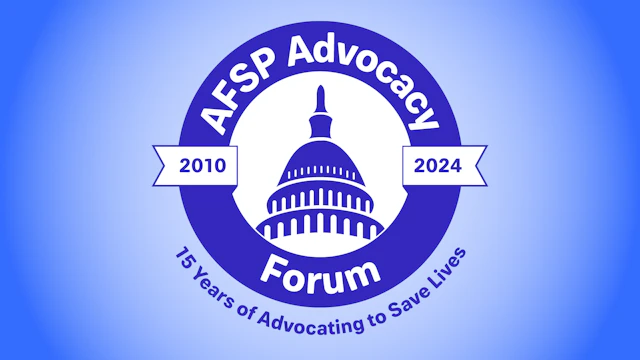In the heart of the nation’s capital, Washington, D.C., from Sunday June 9th to Wednesday June 12th, AFSP hosted its 15th Annual Advocacy Forum! Together, nearly 250 AFSP Volunteer Advocates celebrated “15 years of Advocating for Suicide Prevention” and participated in educational sessions on legislation to improve mental health and save lives. This year, AFSP’s pivotal event focused on the 988 Suicide & Crisis Lifeline, and impassioned volunteers from across the United States urged their members of Congress to support and co-sponsor three crucial bills for the 988 Lifeline: The Improving Mental Health Access for Students Act, the Local 9–8–8 Response Act of 2023, and the CONNECT Act of 2024. These pieces of legislation will increase awareness of and access to the 988 Lifeline, as well as expand essential follow-up services.
Sunday: Awards and Inspiration
The Forum kicked off with uplifting remarks from AFSP Chief Policy Officer Laurel Stine and AFSP CEO Bob Gebbia at the Welcome Reception on Sunday evening, where attendees mingled and celebrated the 2024 Sandy Martin Grassroots Advocates of the Year. These individuals have each made a long-standing impact on suicide prevention in their state. AFSP Chair of the National Public Policy Council David Jobes presented awards to Nancy Farrell of Massachusetts, Mark Patterson of Tennessee, Angela Perry of Oregon, and Ian Perry of Michigan. Honoring these advocates truly set the stage for the transformative days ahead. The night was punctuated by heartfelt video remarks on the importance of suicide prevention from Senator Tammy Baldwin, Representative Mike Bost, and Representative Robert Aderholt –– underscoring bipartisan support for our suicide prevention efforts.
Monday: Education and Empowerment
Monday morning dawned with a hearty buffet breakfast, fueling advocates for a day packed with impactful education sessions each with a focus on a key area of the 988 Lifeline: Awareness, Connection, and Follow-Up.
The day commenced with the first session focusing on “Awareness” and the bipartisan, bicameral bill Improving Mental Health Access for Students Act. Monica Johnson (SAMHSA), Saanvi Arora (Youth Power Project), and Joanna Rosen (AFSP) led engaging discussions on the benefits of adding the 988 Lifeline on student ID cards for college and higher ed students nationwide. Representative Don Bacon provided video remarks to open this session.
Following a spirited mid-morning break, the second session delved into “Connection,” highlighting the bipartisan, bicameral bill Local 9–8–8 Response Act of 2023. Introducing this session were video remarks from the bill’s sponsors in the Senate, Thom Tillis and Alex Padilla. Throughout the session Stephanie Grosser (SAMHSA), Hannah Wesolowski (NAMI), Jim Brewer (NABTU), and Emily Feltren (AFSP) explored technological advancements and community-based crisis response strategies to enhance the 988 system –– ensuring that all callers are connected to the closest crisis call center relative to their general location rather than their area code.
Session three opened with video remarks from Representative Don Beyer and centered on “Follow-Up” and the bipartisan bill CONNECT Act of 2024, featuring insights from Dr. Laura Herrera Scott (Maryland Department of Health), Dr. Tia Dole (Vibrant Emotional Health), and Bill White (AFSP). Their discussions emphasized the importance of post-crisis care and how something as simple as a second phone call or connection to local resources can save lives from suicide.
The afternoon buzzed with breakout sessions focused on Advocacy 101, Media Tools to Impact Capitol Hill, and A Deeper Dive Into 988. The day closed with a keynote presentation and book signing with former congressman and founder of The Kennedy Forum, Patrick J. Kennedy. His remarks inspired advocates, emphasizing how impactful sharing your story can be.
Tuesday: Advocacy in Action
Tuesday dawned with anticipation as advocates gathered at the U.S. Capitol for our annual group photo –– a symbol of our unified commitment to suicide prevention. Hill appointments throughout the day saw advocates meeting with 274 Congressional Offices including over 30 members of Congress. Prepared with advocacy talking points, personal stories, and blue “Advocate for 988” t-shirts, AFSP’s impact and awareness resonated throughout the halls of Capitol Hill. This year we also gave out our “Allies in Action” awards, recognizing members of Congress and their staff who are true champions for suicide prevention and mental health at the federal level!
Wednesday: Celebrating Progress and Looking Ahead
The final day of the Forum commenced with a keynote discussion led by Sean McCluskie, Chief of Staff of the U.S. Department of Health and Human Services. His remarks and the sessions following allowed an opportunity for attendees to reflect on 15 years of advocacy and how far we have come in suicide prevention. Attendees heard from AFSP Advocacy Ambassadors, AFSP staff, and National Public Policy Council members on the development and advancement of the AFSP Public Policy Office, our federal and state policy priorities, and how we are currently engaging over 50,000 Volunteer Advocates nationwide in advocacy and public policy.
A Call to Action: What's Next?
We hope all Advocacy Forum participants carry with them a renewed sense of purpose and a commitment to championing suicide prevention and mental health advocacy in their communities. The goal of the Forum is to not only empower advocates with knowledge about suicide prevention policies and have them forge relationships with policy makers and their staff, but also to create lasting bonds with each other as they come together to make a difference.
Looking forward, AFSP remains steadfast in its mission to prevent suicide, advocating for policies that save lives and supporting those affected by suicide loss. With each passing year, the Advocacy Forum grows stronger, fueled by the passion and dedication of its advocates who stand together, united in their resolve to create a world without suicide.
The AFSP Public Policy office is committed to shaping the future of suicide prevention policy, and with new and seasoned volunteer advocates, is stronger, bolder, and more determined than ever before.
